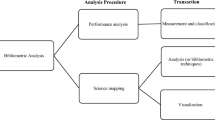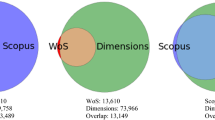Abstract
An article assessment system based on both Tianjin University and nine key Chinese Universities’ academic disciplinary benchmarks was established to evaluate researcher’s published papers. With this scientific benchmarking system, the quality of a researcher’s papers could be easily located in a percentile scale in corresponding field within certain groups. Several factors, including total number of papers, order of authors, impact of journals, citation count, h-index, e-index, a-index, m-quotient, etc., were also utilized for both quantity and quality analysis. Furthermore, the novel proposed weighted citation analysis was introduced to judge a researcher’s contribution to his/her research outcomes. The convenient application and comprehensive evaluation property of this assessment system was thoroughly discussed via a given example.
Similar content being viewed by others
References
Hanney, S., Frame, I., Grant, J., Buxton, M., Young, T., & Lewison, G. (2005). Using categorisations of citations when assessing the outcomes from health research. Scientometrics, 65(3), 357–379.
Hirsch, J. E. (2005). An index to quantify an individual’s scientific research output. Proceedings of the National Academy of Sciences of the United States of America, 102(46), 16569–16572.
Jin, B. (2006). h-Index: An evaluation indicator proposed by scientist. Science Focus, 1(1), 8–9.
Jones, A. W. (2003). Impact factors of forensic science and toxicology journals: What do the numbers really mean? Forensic Science International, 133, 1–8.
Jones, A. W. (2005). Which articles and which topics in the forensic sciences are mostly highly cited? Science and Justice, 45(4), 175–182.
Kademani, B. S., Kumar, V., Surwase, G., Sagar, A., Mohan, L., Kumar, A., et al. (2007). Research and citation impact of publications by the Chemistry Division at Bhabha Atomic Research Centre. Scientometrics, 71(1), 25–57.
Luwel, M., & Moed, H. F. (1998). Publication delays in the science field and their relationship to the ageing of scientific literature. Scientometrics, 41(1–2), 29–40.
Sombatsompop, N., Kositchaiyong, A., Markpin, T., & Inrit, S. (2006). Scientific evaluations of citation quality of international research articles in the SCI databases: Thailand case study. Scientometrics, 66(3), 521–535.
Zhang, C. T. (2009a). The e-index, complementing the h-index for excess citations. PLoS (Public Library of Science) ONE, 4(5), e5429.
Zhang, C. T. (2009b). A proposal for calculating weighted citations based on author rank. EMBO (European Molecular Biology Organization) Reports, 10(5), 416–417.
Acknowledgments
We thank Prof. Chun-Ting Zhang of Tianjin University and Mr. Xiao-Peng Sun of Scopus (Elsevier) for helpful discussions. We also thank both reviewers for their helpful constructive comments and suggestions.
Author information
Authors and Affiliations
Corresponding author
Rights and permissions
About this article
Cite this article
Zhang, L., Zhao, H., Li, Q. et al. Establishment of paper assessment system based on academic disciplinary benchmarks. Scientometrics 84, 421–429 (2010). https://doi.org/10.1007/s11192-009-0132-9
Received:
Published:
Issue Date:
DOI: https://doi.org/10.1007/s11192-009-0132-9




